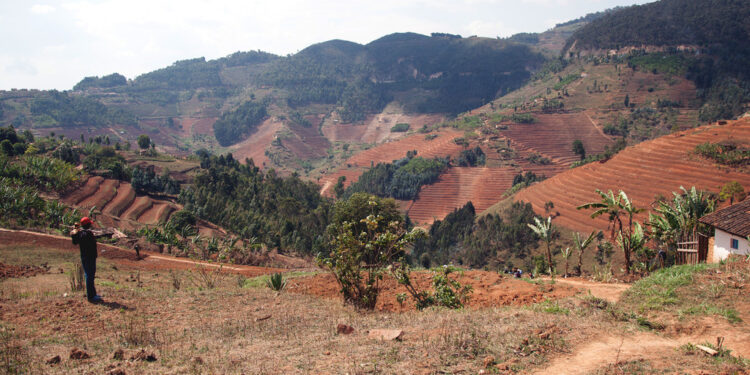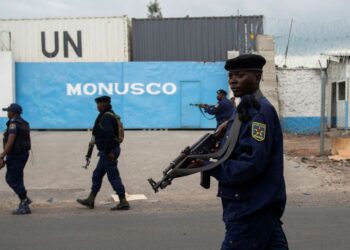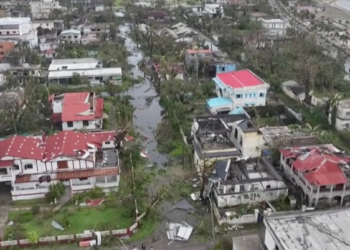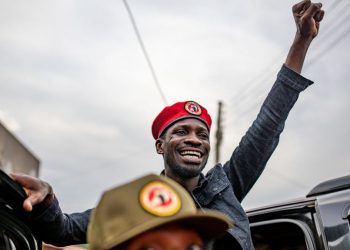Rwanda, a landlocked country in east Africa, is known for its innovation and agricultural prowess. The agricultural sector of this great nation—who has risen from the ashes to take its place in the center stage in Africa and the world—is currently being faced by the devastating impact of climate change. The agricultural sector accounts for 27% of Rwandan Gross Domestic Product (GDP), and the current threats it faces are unprecedented. Within the last few years, the nation has witnessed a tremendous increase in temperatures accompanied by erratic rainfall, which jeopardizes crop yields, food security, and rural livelihoods. Subsistence and commercial farmers are both affected by this trend, and as time goes by, it worsens, putting the country at high risk of food scarcity.
Rwandan agriculture and its importance to the Rwandan economy
Rwanda has a population of 13.7 million people, and the agricultural sector of Rwanda employs about 64.5% of the country’s population. In 2023, the sector also accounts for 27% of the nation’s GDP. Agriculture is a very important occupation for the inhabitants of the densely populated landlocked country. In fact, 74.5% of the country’s land use is put into agriculture due to its fertile and arable land. Agriculture holds a position of high esteem for the great number of farmers who are mostly rural dwellers, and its importance to Rwanda’s economy cannot be overemphasized.
Agriculture not only plays a pivotal role within the country; its influence goes beyond the nation’s borders. According to the Ministry of Agriculture and Animal Resources (MINAGRI), agriculture is an important source of foreign exchange. Crops such as tea, coffee, pyrethrum, fruits, vegetables, flowers, cereals, grains, macadamia, and stable foods are being exported as cash crops and, as such, contribute about 63% of the value of Rwanda’s export.
Climate Change and the Agricultural Sector
Rwanda sits at the Great Rift Valley of East Africa, a location where the Great Lakes region and Southeast Africa converge. Unfortunately, the impact of climate change in these regions is nothing but devastating. Climate change in Rwanda has a ripple effect; it is affecting agricultural productivity, leading to poor yields, putting the nation at high risk of food insecurity. Rural farmers, who are the backbone of the agricultural sector in Rwanda, bear the brunt of this carnage. Though mostly small-scale and subsistence farmers are very important to the agricultural sector, their contributions—no matter how little, yet consistent—to nation-feeding cannot be taken for granted. Whatever affects their productivity would also affect the national food basket.
Climate change has impacted the usual pattern of rainfall: in some years there is very minimal rainfall while in others it is excessive. This has in some cases led to erosion, washing soil off arable land, depriving the soil of the needed nutrients, resulting in poor yields. In some cases, formerly productive lands are rendered useless. In addition to these, the nation has been experiencing increased rainfall extremes; the raining seasons are getting shorter while the dry seasons tend to get longer; this has been observed in the northern and western provinces of the country.
In 2018, the devastating impact of climate change cost Rwanda more than $200 million in damages to crops, livestock, and properties. In addition to existing climate variability, additional net economic costs of climate change could be equivalent to a loss of about 1% of the country’s GDP each year by 2030.
Livestock are not spared of the impact of climate change in Rwanda. The ever-increasing temperatures increase heat stress for livestock, reducing their fertility, productivity, and growth. In some cases, livestock, such as poultry, are killed by the incessant heat. Livestock vulnerability is also increased due to climate change. The ever-increasing temperatures make the breeding grounds of livestock a haven for bacteria and parasites, weakening their immune systems and causing diseases and deaths. Increased temperature also escalates pest populations, which cause damage to crops. Extreme weather events like heatwaves and cold snaps can also increase the mortality rate of livestock.
Water scarcity due to lack of rainfall not only affects humans and plants; it’s impact is also felt by livestock. Water is mostly used for their feed preparation and production; the unavailability of water due to rainfall patterns negatively affects the production quality and quantity. Their nutrition is therefore compromised, and in some cases, they suffer or die from dehydration.
Grazing land for cattle, sheep, and goats has also been severely impacted by climate change. Soil degradation and desertification shrink the available grazing areas, thereby depriving farm animals of food. Climate-driven livestock losses can also increase human migration and conflict. People leave their rural communities and villages in search of greener pastures for their livestock. In some cases, they may encroach the territory of other livestock farmers, escalating tensions and even conflicts.
Climate Change and Food Security
The impact of climate change in Rwanda has cataclysmic consequences for food security. Climate change has led to low quality and poor yields of agricultural produce. The low quality of the produce makes them unfit for export, thereby affecting the nation’s foreign exchange. The poor yields of the produce reduce the amount of food available for consumption, let alone export.
As the impact of climate change continues to be felt in Rwanda, food availability becomes a struggle. Households no longer have accessibility to food as they used to due to poor quality and poor yields of farm produce. Food accessibility becomes a luxury; the disruptions in the supply of food cause food prices to become volatile, leading to food prices soaring like the increasing temperatures. Food distribution and storage are also compromised due to contamination and spoilage, thereby affecting access to food for future consumption.
The changes in rainfall patterns lead to water scarcity, negatively impacting irrigation. Erosion due to excessive rainfall caused by extreme weather events degrades soil and depletes it of micro- and macronutrients needed for plant growth. These in turn impact food production. Heat stress caused by increasing temperature, diseases, and low quality and quantity of livestock feeds lowers productivity.
Traditional crops in Rwanda are also being threatened. There is massive loss of traditional crops that are not resistant to a changing climate. The impact is a loss of culture and agricultural tradition.
Smallholder farmers, rural communities, indigenous peoples, and low-income households are the most vulnerable to food insecurity. These people rely on the day-to-day access to food for their survival. The scarcity of food induced by the negative impact of climate change tremendously increases their struggles. Migration and conflicts can also be fueled by food insecurity.
In essence, climate change has dire consequences for food security. Whole communities are plunged into a state of despair for food and extreme poverty; prices skyrocket, and the quality of life is undermined.
Adaptation and mitigation strategies
Indeed, the negative impact of climate change on Rwandan agriculture and food security can have dire consequences; there is, however, a need for adaptation strategies and mitigation where feasible.
The UN Environment and its partners have given a helping hand to Rwanda to help it adapt to the ever-changing climate. The UNEP has helped restore lands with climate-resistant species in order to combat the impact of climate change. These include crops and livestock, and the benefits to these affected communities are plentiful. The UNEP uses an ecosystem-based approach (EbA) in restoring wetlands, rainforests, and savanna deteriorated by climate change and environmental degradation. These ecosystems’s resilience to climate change is enhanced and their vulnerability reduced.
There have also been numerous community-led initiatives and technological innovations to boost agricultural productivity, improve soil fertility, adapt, and mitigate climate change. There are innovations in the agricultural sector like app monitoring for plants, keeping an eye on their growth pattern, needs, and health, thereby boosting productivity.
Some of the adaptation strategies that have been employed by these bodies include climate-resilient crops and breeds of animals, improved animal health management, conservation agriculture, enhanced feeding strategies, improved shelter and housing, climate-smart agricultural practices—vvertical farming—such as hydroponics and aeroponics, early warning systems, emergency preparedness, and support for smallholder farmers and rural development.
The government of Rwanda has also stepped in, putting in place a legal, policy, and strategic framework to deal with the adverse impact of climate change and climate variability-induced risks and economic losses.
The government of Rwanda also adapted in 2011 the Green Growth and Climate Resilient Strategy, whose key adaptations include sustainable intensification of agriculture, sustainable forests and agroforestry, agriculture diversity in local and export markets, climate data and projections, Integrated Water Resource Management (IWRM), and planning. These strategies are designed to help the nation adapt to an ever-changing climate and be prepared against the impact of climate change.
In essence, the negative impact of climate change on Rwandan agriculture and food security should not be taken lightly; rather, swift, well-thought-out plans and policies by policymakers and stakeholders should be implemented to help mitigate and adapt to climate change. Climate-resilient agricultural practices should be encouraged and financed by the government and investors. Institutional capacity building should become the norm, and there should be adequate funding for environmental and climate-related projects. Enhanced early warning systems should also be institutionalized. All hands must be on deck to take responsibility.



























































